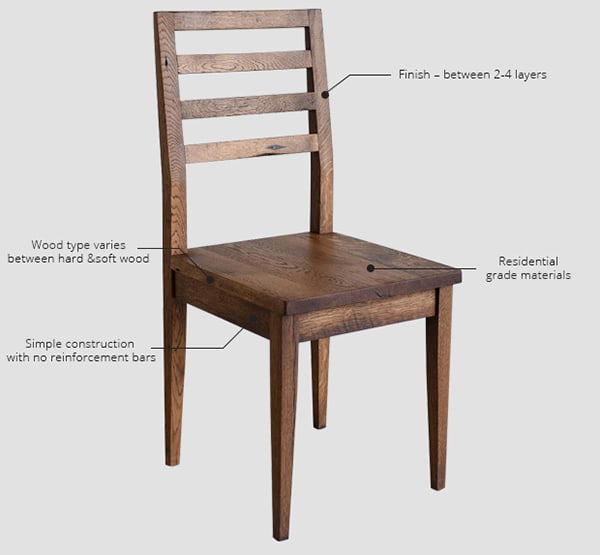What Does Contract Grade Mean: Essential Quality Insight
Contract grade refers to furniture designed and manufactured for commercial use in spaces such as restaurants, hotels, and offices. It is built to withstand the wear and tear of frequent use by a large number of people, offering durability and longevity.
This type of furniture is typically more expensive due to the use of high-quality, durable materials, and it often comes with customization options and longer lead times. Contract grade furniture is a preferred choice for commercial settings where safety, durability, and customization are essential.
It offers businesses the assurance of long-term performance and support, making it a valuable investment for commercial spaces.

Credit: www.tuckey.com
Introduction To Contract Grade Furniture
Contract grade furniture, also known as commercial grade furniture, is designed for commercial spaces like restaurants and hotels. It is built to withstand heavy daily use and is usually more durable than residential furniture.
Defining Contract Grade
Contract grade furniture is specifically designed for commercial use in spaces like restaurants, hotels, and offices.
Common Misconceptions
Contrary to common belief, contract grade furniture is not necessarily cheaper than residential furniture.
Key Characteristics Of Contract Grade Furniture
Contract grade furniture refers to furniture designed for commercial use, such as in restaurants, hotels, and offices. It is built to withstand heavy daily usage and is often more durable and customizable than residential furniture. This type of furniture is generally more expensive due to its high-quality materials and longer lead times for production.
Material Quality
Contract grade furniture features high-quality materials such as commercial-grade fabrics and finishes.
Design And Durability
Durable design elements are paramount in contract-grade furniture to withstand heavy usage.
Safety Features
Contract grade furniture often includes enhanced safety features to meet commercial standards.
Comparison With Residential Furniture
Contract grade furniture refers to furniture specifically designed for commercial use in spaces such as restaurants, hotels, and airports. It is built to withstand heavy daily usage and is often more durable and customizable than residential furniture.
Comparison with Residential Furniture When it comes to furniture, there are two main categories: residential and contract grade. Residential furniture is intended for use in homes, while contract grade furniture is designed for commercial spaces. While there are similarities between the two, there are also some important differences to consider. Material Differences One of the main differences between contract grade and residential furniture is the materials used in their construction. Contract grade furniture is typically made from more durable materials, such as heavy-duty fabrics and high-quality metals. This is because commercial spaces see a lot more foot traffic and wear and tear than residential spaces. Residential furniture, on the other hand, can be made from a wider range of materials, including more delicate fabrics and woods. Cost Implications Another difference between contract grade and residential furniture is the cost. Contract grade furniture is typically more expensive than residential furniture because it is designed to last longer and withstand more use. Additionally, contract grade furniture is often made to order, which can drive up the cost even further. Residential furniture, on the other hand, is often mass-produced, which makes it more affordable. Usage Scenarios Finally, contract grade and residential furniture are designed for different usage scenarios. Contract grade furniture is intended for use in commercial spaces such as restaurants, hotels, and airports. It is designed to withstand heavy use and abuse, and is often more customizable to meet the needs of specific spaces. Residential furniture, on the other hand, is intended for use in homes, where it is subjected to less wear and tear. In conclusion, while there are similarities between contract grade and residential furniture, there are also some important differences to consider. If you are looking for furniture for a commercial space, contract grade furniture is likely your best bet. However, if you are looking for furniture for your home, residential furniture may be a better choice.Industries That Utilize Contract Grade Furniture
When it comes to furnishing commercial spaces, using contract grade furniture is essential to ensure durability and safety. Contract grade furniture, also known as commercial grade furniture, is designed and manufactured specifically for use in high-traffic commercial environments. This type of furniture is built to withstand heavy use and is subject to rigorous testing to meet industry standards and regulations.
Hospitality
Hospitality industry relies heavily on contract grade furniture for its establishments such as hotels, restaurants, and cafes. The furniture used in these spaces must be durable, easy to clean, and aesthetically pleasing to create a welcoming environment for guests.
Healthcare
In healthcare facilities, including hospitals, clinics, and long-term care centers, contract grade furniture is crucial for maintaining a hygienic and comfortable environment. The furniture must be resistant to stains, moisture, and bacteria to ensure the safety and well-being of patients and staff.
Education
From classrooms to libraries, educational institutions require furniture that can withstand heavy daily use by students and faculty. Contract grade furniture in educational settings needs to be robust, ergonomic, and conducive to learning and collaboration.
Corporate Offices
Corporate offices demand furniture that is not only durable but also reflects the professional image of the organization. Contract grade furniture in this setting should be ergonomic, versatile, and contribute to creating a productive work environment.
Benefits Of Choosing Contract Grade Furniture
Contract grade furniture, also known as commercial grade furniture, is specifically designed and manufactured for use in commercial spaces such as restaurants, hotels, offices, and healthcare facilities. Choosing contract grade furniture for your commercial space comes with several benefits, including:
Longevity And Investment
Contract grade furniture is built to withstand heavy daily use, making it a long-term investment for your business. Its durable construction ensures that it can withstand the rigors of a busy commercial environment, reducing the need for frequent replacements and saving you money in the long run.
Customization Options
When you opt for contract grade furniture, you have the opportunity to customize the pieces to suit your specific aesthetic and functional requirements. This level of customization allows you to create a cohesive and unique look for your commercial space, enhancing its overall appeal.
Support And Warranty
Contract grade furniture is typically accompanied by comprehensive support and warranty packages. This provides you with peace of mind, knowing that you have access to professional support and that your investment is protected against manufacturing defects and premature wear and tear.

Credit: loftwall.com
Challenges In Producing Contract Grade Furniture
Contract grade furniture is designed to withstand heavy use and is ideal for commercial settings such as restaurants, hotels, and airports. However, producing contract grade furniture comes with its own set of challenges. In this section, we will discuss the three biggest challenges faced by manufacturers when producing contract grade furniture: higher costs, longer lead times, and specialized manufacturing.
Higher Costs
Contract grade furniture is typically more expensive than residential furniture. This is because contract grade furniture is manufactured with more durable materials and is designed to withstand heavy use. Additionally, contract grade furniture is only available from specialized companies, which further drives up the cost.
Longer Lead Times
Another challenge faced by manufacturers when producing contract grade furniture is longer lead times. This is often due to the larger quantities needed for commercial projects and the customization options required. Manufacturers need to ensure that the furniture is not only durable but also meets the specific design requirements of the commercial project.
Specialized Manufacturing
Lastly, producing contract grade furniture requires specialized manufacturing techniques. Manufacturers need to ensure that the furniture meets specific safety regulations and durability standards. This often involves using specialized materials and manufacturing techniques, which can be expensive and time-consuming.
In conclusion, producing contract grade furniture comes with its own set of challenges. Higher costs, longer lead times, and specialized manufacturing are just a few of the challenges faced by manufacturers. However, by overcoming these challenges, manufacturers can produce furniture that is not only durable but also meets the specific design requirements of commercial projects.
How To Identify High-quality Contract Grade Furniture
When sourcing furniture for commercial spaces, it’s essential to identify high-quality contract-grade pieces that are durable and meet safety standards.
Certifications To Look For
1. Look for BIFMA certification which ensures that the furniture meets industry standards for safety and durability.
2. Check for GREENGUARD certification indicating that the furniture meets strict chemical emissions limits, contributing to healthier indoor air quality.
3. Consider ISO 9001 certification for quality management systems, ensuring consistent quality in manufacturing.
Key Questions To Ask Suppliers
1. Do you provide warranty for your contract-grade furniture?
2. Can the furniture be customized to suit specific design requirements?
3. What materials are used in the construction of the furniture to ensure durability?
4. Are the furniture pieces tested for compliance with industry standards?
By focusing on these certifications and asking the right questions, you can ensure that you are investing in high-quality contract grade furniture for your commercial space.

Credit: www.restaurantfurniture.net
Future Trends In Contract Grade Furniture
As the furniture industry continues to evolve, several key trends are shaping the future of contract grade furniture.
Sustainability Focus
In response to growing environmental concerns, contract grade furniture manufacturers are increasingly incorporating sustainable materials and production practices.
Technological Integrations
The integration of technology in contract grade furniture is on the rise, with features like built-in charging stations and IoT connectivity becoming more common.
Evolving Design Preferences
Design preferences for contract grade furniture are evolving towards modern aesthetics, sleek lines, and multifunctional pieces to optimize space in commercial settings.
Frequently Asked Questions
Is Contract Grade Furniture Better?
Contract grade furniture is better for commercial spaces due to its durability, safety, customization options, warranty, and support.
What Does West Elm Mean By Contract Grade?
West Elm’s contract grade furniture is designed for commercial use, with durable materials and longer lead times.
Is Contract Grade Cheap?
Contract grade furniture is not cheap. It is typically more expensive due to durable materials and specialized manufacturing processes.
What Does “not Contract Grade” Mean?
“Not contract grade” means furniture not suitable for commercial use, designed for residential purposes.
Conclusion
Contract-grade furniture offers durability, safety, customization options, warranty, and support, making it ideal for commercial spaces. It is specifically designed to withstand the rigors of daily use and is manufactured with durable materials, ensuring longevity and performance. This makes it a preferred choice for businesses seeking reliable and long-lasting furniture solutions.
